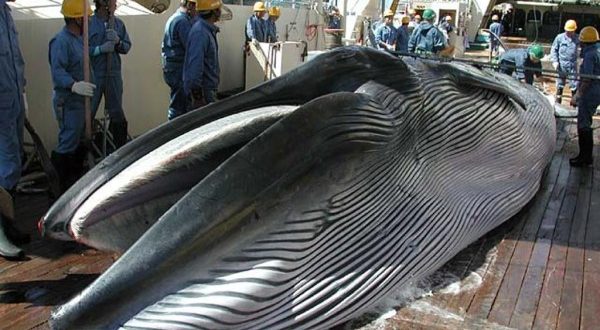Japan plans to continue its whaling program with scientific ends despite the non-binding resolution recently approved by the International Whaling Commission (IWC) to increase surveillance on such activities, local media reported.
Japan conducts its whaling under a self-issued permit, under Article VIII of the International Convention for the Regulation of Whaling. This article allows a country to grant its nationals special licence “to kill, take and treat whales for purposes of scientific research subject to such restrictions as to number and subject to such other conditions as the Contracting Government thinks fit”.
In 2014 the International Court of Justice ruled Japan’s JARPA II whaling program illegal on the basis that it was “not for the purposes of scientific research” and therefore in breach of Article VIII. But crucially it did not ban all future scientific whaling activities by Japan.
After the decision, Japan created a new research programme called NEWREP-A (New Scientific Whale Research Program in the Antarctic Ocean), which purported to have different scientific methods to its predecessor.
As Japan no longer recognises the jurisdiction of the International Court of Justice regarding “living resources of the sea”, arguments on adherence to the broader principle laid down in the decision would possibly be in vain.
A new tack
This brings us back to the new resolution, which was brought to the IWC by Australia, New Zealand and other anti-whaling nations in a bid to make it harder for nations such as Japan to issue themselves with special permits for scientific whaling.
The underlying principle is Australia’s repeated assertion that “lethal scientific research is simply not necessary”.
Japan’s new NEWREP-A program included the killing of 333 minke whales in the 2015-16 season, and the IWC’s Scientific Committee was powerless to prevent Japan from proceeding, given that the conditions of special permits are currently self-assessed and can proceed without scientific endorsement from the committee.
The new resolution establishes a Working Group under the Convention, which will consider the Scientific Committee’s recommendations in relation to all special permits. It also gives a greater role to the Commission in the process of issuing special permits.
The aim is to apply much greater scrutiny to the granting of special permits, rather than allowing nations simply to award them to themselves. Plans for special permits are requested to be submitted to the new working group at least six months in advance of the Scientific Committee’s meeting, alongside the data used to back up a country’s claims to be running a scientific whaling program. These data will be evaluated both during the program’s development, and during ongoing and final reviews.
These inquiries into the special permit will then be presented to the IWC itself, which will form its own official view on the proposed whaling program and publish its findings.
Overall, the resolution gives the Commission a much greater role in deciding whether a given nation should be allowed to kill whales. But resolutions are not legally binding, and there is no function to penalise those who do not follow them.
Non-binding resolutions
In response to the new resolution, Japan’s Commissioner to the IWC said that Japan “will abide by the Convention itself”. This implies that Japan will continue to apply its own interpretation of the Convention, and will not follow the extra steps outlined in the new resolution.
So despite the new emphasis on applying scientific scrutiny to whaling permits, at a higher level than before within the IWC’s structure, this actually doesn’t mean much in practical terms for Japan. The reality is that Japan will continue to act independently of IWC advice due to its view on what Article VIII means.
As a result, Japan is unlikely to stop killing whales any time soon, despite the efforts of Australia, New Zealand and other anti-whaling nations to shut the program down.
Agencies/Canadajournal
 Canada Journal – News of the World Articles and videos to bring you the biggest Canadian news stories from across the country every day
Canada Journal – News of the World Articles and videos to bring you the biggest Canadian news stories from across the country every day




Well, if that’s how Japan feels about it we should just permit ourselves to go sink their boats.
Oopps, sorry about those torpedoes hitting your boats and sinking them, we had a newbie on the controls and is a firm believer in Taiji Karma. We’ve since replaced him and set him onto the Titan rocket launchers…
Have a nice day.